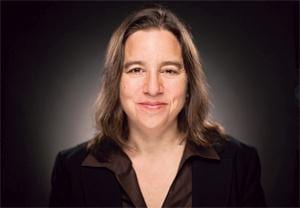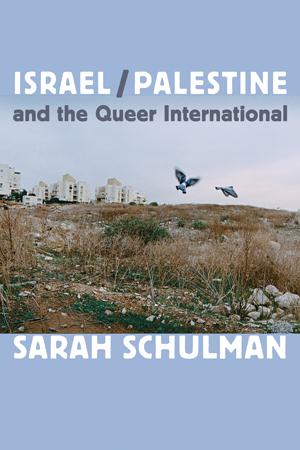
Sarah Schulman's latest book delves into Middle East politics and activism and includes a section about Toronto. Credit: Shimon Karmel
Sarah Schulman’s Israel/Palestine and the Queer International documents her journey as a gay American Jew seeking to better understand the Palestinian liberation struggle. In the excerpt below, Schulman arrives in Israel on a “solidarity visit” and meets several members of Mesolelot, an Israeli lesbian group whose aim is to show the relationship between the fight for queer rights and the Palestinian struggle.
My second night of Passover was spent on the El AI red-eye from London to Tel Aviv.
“We wish you all a very happy holiday,” the pilot said over the loudspeaker. “And assure that all your food is kosher for Pesach.”
Then the flight attendants handed out the matzoh. Getting through security in London brought back the same feelings I’d had on my first visit to Israel twelve years before. There is something about the sight of young Jewish people in these military, police, and security positions that repulses me. It makes me feel afraid, not secure. In fact, I realize perhaps again, that Jewish authority, Jewish police, Jews in uniforms, Jewish governments, all these things bothered me. I am truly an American Jew in this way. I prefer to be one of many.
“What are you doing in Israel?” the Israeli security agent in London asked; she could have been a social worker from Brooklyn had she been born in the diaspora. But since she was born in Israel, she was carrying a gun.
“I am going to visit my cousins,” I replied with a sentence I had practiced repeatedly in preparation for this moment.
“What are their names?” I gave full names to AZ in Tel Aviv and LA in Kibbutz Mizrah, knowing that they sound perfectly Zionist.
She laughed. People also laughed twelve years ago when I said “Kibbutz Mizrah.” I guess fewer and fewer tourists go to visit family members on a kibbutz, although I wasn’t sure that’s why she laughed. It could be a trick of some kind, I thought. Or she might be human. I wasn’t sure.
“Do you speak Hebrew?” she asked.
“No.”
“Nothing? You didn’t even go to Hebrew school when you were little?”
“Ahnee lo medeberate eevreet,” I said in my horrible nonaccent. It wasn’t the complete truth. I could also say good morning, good evening, the pencil is on the table, and Hear Oh Israel, the Lord our God, the Lord is One. She let me go by.
I arrived in Israel at 5:30 A.M., had no problem getting through customs, and took a cab to Udi’s generously lent apartment just blocks from the beach. Outside was what seemed to be the movie set of an idealized Tel Aviv. The most beautiful streets, the most intelligent architecture, the loveliest plazas, the most attractive cafés, the gorgeous beach where one could walk for hours past the religious people enjoying Pesach. Gay people can hold hands, and the religious just look away. This is the theater set of liberated Tel Aviv: beautiful, sophisticated, tolerant.
Thursday night at 5, I went out to meet with the Mesolelot (Tribads). I arrived at an airy apartment to find four women waiting for me around a large bottle of iced tea. One of them was Sonya, the organizer of my solidarity visit. Sonya turned out to be a very likeable young butch woman, a Russian immigrant, whose commitment to the community is continually revealed through the course of the evening. She explained that she not only works as an activist in the anti-occupation movement but also is a master’s student in modern British literature at Tel Aviv University and works with LGBT kids in one of two government-funded service organizations.
Next to her was Tal, a pansexual, slightly manic, extremely articulate, and smart, hardcore politico; she had that “dangerous femme” aura, evidenced by the fact that her blouse was open two buttons too many throughout the conversation. Also in the room were a self-described “Moroccan” woman, J, whose English was not strong enough for us to communicate much, and a bisexual daughter of South African immigrants. They all seemed to be between twenty-five and thirty-five.
Before this trip, I, having entirely ignored Israel, knew nothing about a good many things, among them the Ashkenazi/Sephardic/Mizrahi breakdown in Israel. I quickly learned that it permeates everything. I grew up aware of some friends of my mother’s who spoke Ladino. They were described to me as “Sephardic.” I knew that there were Sephardic Jews and Ashkenazi Jews, but I never had any inkling that there was any conflict between the two groups. I certainly did not know that there were many Arab Jews who were not descendants of Spanish escapees of the Inquisition, but were instead indigenous to the Middle East, going back two thousand years. In the very Ashkenazi world that I grew up in, the number one division between Jews was between Germans and Russians. German Jews were cultured, spoke languages (Yiddish didn’t count), and played instruments, and Russian Jews were grubayink (common) and trying to make a living. In fact, I had never heard the word Mizrahi (except to know that the name of East Germany in Yiddish was “Mizrach Daitchland”) until I came to Israel. My friend and colleague Dalia Kandiyoti, who had started me off on this journey, had helped me to see the Ashkenazi dominance of Judaic studies. I was also vaguely aware of the work of Ella Shohat and the interest some Arab Jews had in reconnecting as part of the Arab people, but I had no idea that Arab Jews, Sephardim, and Mizrachis were discriminated against by Ashkenazis in Israel or that the enactments of this discrimination were highly racialized. In a way, I didn’t even know enough to wonder. It was part of knowing nothing about Israel. It was just ignorance. Once again I have no excuse. J was the first of many Israelis to introduce themselves to me as “Moroccan.” At first I didn’t know why, but then finally understood that this was reclamation of a demeaned category. I started to hear nightmarish stories of marginalization: Ashkenazis who won’t date Mizrachis, the diminishment of Mizrachis as crass and tacky. Stories of Mizrachi parents keeping their children out of the sun so their skin won’t darken. These are paradigms right out of American white supremacy.
I asked the small group what their goals are, what they need. Their answers: “Visibility” rearticulated in many different ways. Parity with gay men, some recognition from society, a chance to be seen, to exist. Simple existence, integration, basic acknowledgment. These desires poured out of them. In fact, their answers to my short questions were long, passionate, and filled with the need for change, for a place to be. Even in liberated Tel Aviv.
When we talked about the occupation, they said they wanted to make the “connections between struggles”; I noted their use of this kind of old-left language, and their clearly hard-won acceptance of the wrong that is the occupation. But they didn’t have political visions, they didn’t know how to develop strategies. They were filled with a longing for some kind of liberation but lacked the experience and training to be able to imagine it. They didn’t have a concrete goal or an understanding of how to work toward a goal. It had taken every ounce of drive, personal integrity, intellectual honesty, and personal truth that each of them could muster just to get this far: to be out as queer and as anti-occupation. In other words, they were smart, they were brave, they had integrity, they knew the difference between right and wrong, but they didn’t have the experience or opportunity necessary to build an effective and mature political movement.
At one point the conversation moved to this curious link between the occupation and lesbian life in Israel. This is a new variation on the theme of bringing together queer and Palestine, but it enriched and enhanced my understanding of this intrinsic relationship. They spoke of Israelis as “post trauma.” They said that everyone is shut down in part as a result of their experiences in the army. And then they said something that I will hear over and over again — that in Israel everyone lives as though “it” could all end at any time. “It” meaning life itself, the land of Israel, the beach, Tel Aviv Gay Pride, the beautiful cafés. To me it sounds more like a vision for apocalypse rather than reality, but then I remember that the men running this country would rather be destroyed than compromise. Given their circumstances and their path, Israel could actually drive itself to its own destruction. Since they are the ones in control, annihilation is actually possible.
Suddenly the conversation shifted, and this room of lesbian women turned into a gathering of ex-soldiers. Lesbians are quasi-out in military training, they said. But sometimes this disappears by the time of active duty — even though the government, in its need for soldiers, has no antigay restriction on who can serve. It needs every soldier it can get. But the culture of lesbians in the army includes those with an inclination toward combat units, with a competitive desire to achieve in the military, and with a hope that having done military service can somehow normalize them in Israeli society and mitigate the stigma of their being queer. Someone makes a joke about the “crush on the commander” as something that bonds women soldiers in general, something even the straight ones like to talk about.
“That’s why motherhood is everything here,” Tal said. “You can’t ever have a real role here unless you have children, because mothers produce soldiers, and that is what the country wants.”
“Even more,” J said. “Mothers are valued because they create soldiers, but also because they create Jews.”
Suddenly Tal started to talk about her military service in Gaza. How she saw a Palestinian man, his shirt torn off, on his knees, hands handcuffed behind his back. How she, based on who she was at that time, simply assumed that he had done something wrong and deserved to be treated that way. But by the time we were talking, she realized that he could have done nothing. Or that he could have done something that was an action to free himself from the occupation. Now, looking back, she asks herself, “How did his shirt get torn off his body?” — a question she never asked herself then. There is a haunted quality to this story. She didn’t say it, but it was apparent that her activism in the anti-occupation movement is an attempted corrective to the pain she caused Palestinians unjustly in the past. But how many Israelis come to the understanding that they can turn poison into medicine? Not many.
“They relive the trauma,” one woman said. “People tell their army stories over and over again.” She worked in intelligence and knew about an assassination days before it occurred, she said. She went to America and, when she returned, was called back again into the reserves and fought in the most recent war in Lebanon. At the time she did not question her own role. Now she knows.
These women carry this knowledge into not only their current political activities but also into their love relationships.
“Is it possible,” I asked, “for lesbians to have a healthy relationship in Israel today?”
They all shook their heads no. Then they all said “no” at the same time.
And then there was an almost palpable sadness. “No.”

 Why you can trust Xtra
Why you can trust Xtra


